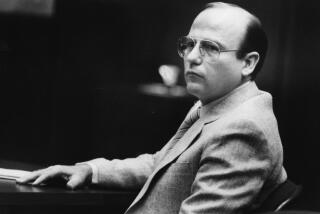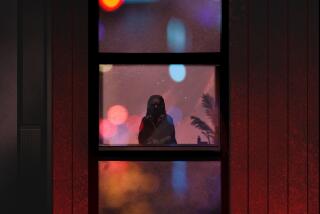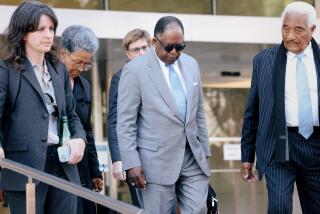Court Overturns Fleiss’ Conviction, Orders New Trial
- Share via
Charging that juror misconduct in the case of the Hollywood Madam turned “a serious proceeding into a farce,” a state appeals court panel has overturned Heidi Fleiss’ 1994 pandering conviction and ordered a new trial.
Although the unusual 15-page opinion by the 2nd District Court of Appeal was filed Tuesday, news of the decision did not reach the principals until Wednesday.
Rendered nearly a year and a half after the Los Feliz pediatrician’s daughter was found guilty of operating one of Los Angeles’ most exclusive call girl rings, the opinion found that jurors in the case traded votes to avoid a deadlock--and to satisfy a contingent who wanted to minimize her punishment.
The malfeasance, later detailed by jurors under a grant of immunity, was characterized by one judge as “a transgression worse than those with which Fleiss was charged.” The jurors involved could not be reached for comment.
Fleiss--now 30, a regular at weekly Narcotics Anonymous meetings and the proprietor of a HeidiWear sportswear boutique on Santa Monica’s Third Street Promenade--reacted with unmitigated joy.
“You don’t know what this means to me,” she blurted out before taking a more circumspect tone.
“I’m relieved that the momentum at least seems to be going forward,” she added somberly. “Hopefully it will continue that way.”
Deputy Atty. Gen. David F. Glassman, who argued against the reversal, called it an “ironic windfall” for Fleiss and contended that the appellate judges misunderstood the ruling of Superior Court Judge Judith L. Champagne when she determined last March that the verdict should stand.
Glassman said the appeals panel should have held a hearing to clarify Champagne’s analysis of the request for a new trial, and noted that the state attorney general’s office still has the option of asking the panel to reconsider its findings.
If the state attorney general does not take that option or appeal the decision to the state Supreme Court, the matter will be returned to the Los Angeles district attorney’s office, where a decision will be made on whether Fleiss should be retried. Sandi Gibbons, spokeswoman for the district attorney, said the office was studying the ruling and would have no comment until after its review.
Sheila Mitrowski, who was the jury forewoman on the case, said the guilty verdict “has preyed on my conscience for a long time.” She is relieved, she said, by the decision to overturn the conviction.
“I can’t tell you how delighted I am by this,” she said. “Justice was not served in the case. Three years in prison for what she did? Give me a break. That’s outrageous.”
She now views Fleiss as innocent: “The only reason for the verdict we came up with was the entrapment law was very, very technical and hard for a person without any legal background to understand. To be honest with you, a few of the male jurors decided she was guilty before we even began deliberating. And others were simply confused by the entrapment law. Looking back on it with hindsight, I can see that entrapment was at the heart of every single count.”
The state appeals court decision adds yet another colorful chapter to the saga of the Hollywood Madam, a case that during the last three years has titillated the nation and rekindled the age-old debate about whether prostitution should be considered a crime.
Until this week, Fleiss was facing a three-year sentence on the pandering conviction. She has also been convicted in federal court on potentially more serious charges of money laundering and tax evasion. Sentencing in that case has been set for Sept. 20.
Fleiss, a high school dropout and onetime Gal Friday to the late Beverly Hills madam Elizabeth Adams, was thrust into the spotlight in August 1993 when she was arrested and charged with pandering and possession of cocaine for sale.
The arrest--the fruit of a complex sting operation in which a Beverly Hills detective posed as a Ferrari-driving Hawaiian businessman--shook Hollywood to its core with rumors that her clientele included entertainment industry figures. Later proceedings in federal court would pinpoint a number of johns, who all testified under grants of immunity. Among them were the onetime owner of the Denver Nuggets pro basketball team, Sidney Shlenker; Australian media tycoon Kerry Packer; real estate heir Bob Crow, and actor Charlie Sheen.
The state evidence, however, was limited to the vice sting, which took place in a Beverly Hills hotel suite. Hidden cameras filmed the activities of four women sent by Fleiss to entertain four police officers who posed as Japanese businessmen celebrating a deal.
Prosecutors produced tapes of phone conversations between Fleiss and Beverly Hills Det. Sammy Lee that led to two fateful assignations with prostitutes in June 1993. In those conversations, Lee explained to Fleiss that on the first night, he wanted a brunette and a small quantity of cocaine; on the next night, he added, he wanted four women to entertain his friends. On the tapes, Fleiss replied that the deal would be “no problem,” and subsequently the women showed up at the hotel.
The state trial featured testimony from Colorado-born model Samantha Burdette, who, between applications of lipstick, told the jury that she had been sent by Fleiss to entertain Lee. Film of their encounter showed Burdette lounging in red underwear at the hotel, and then being sent away after Lee was “interrupted” by a telephone call.
Then, the tapes showed, she returned the next night with three other women and the cocaine. After more than an hour of conversation--the undercover officers speaking gibberish they hoped would pass for Japanese--the four women did a striptease. As the last of them got down to her underwear, police stormed in and placed them all under arrest.
Prosecutors contended that Fleiss had willingly procured drugs and women, knowing it was against the law. But defense lawyers Anthony Brooklier and Donald Marks argued that she had been entrapped by overzealous vice officers and induced to commit an act that would never have occurred had the police not set events in motion.
A jury deliberated four days before reaching a verdict in Fleiss’ case, convicting her on three counts of pandering, deadlocking on two other pandering counts and acquitting her on the cocaine charge. Within hours of the verdict, however, it was clear that at the very least Fleiss’ punishment would not be what the jurors had in mind.
Several members of the panel expressed deep remorse when reporters informed them that state law mandates three years imprisonment for pandering. Later, in sworn affidavits, five jurors admitted that they had discussed the case outside the jury room.
Then, in a second batch of affidavits, four jurors offered more details, saying they had speculated about the potential punishment faced by Fleiss--a violation of the judge’s orders.
Under the mistaken impression that the narcotics charge carried a stiffer penalty, jurors said, they offered to vote guilty on pandering counts in exchange for a not guilty vote on the drug-related offense. The trading, they said, was necessary to avoid a hung jury because the panel was badly split.
More to Read
Sign up for Essential California
The most important California stories and recommendations in your inbox every morning.
You may occasionally receive promotional content from the Los Angeles Times.













